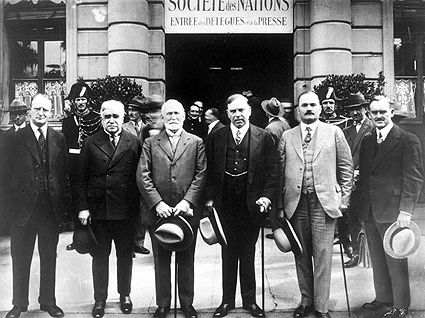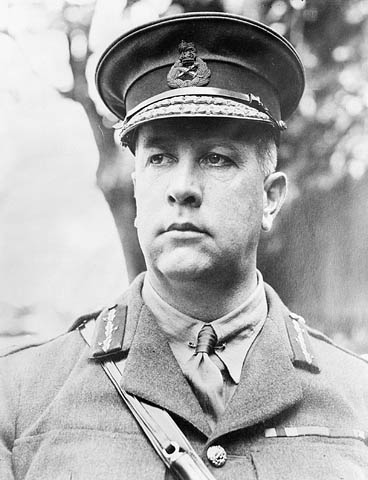John Wesley Dafoe, journalist and liberal reformer (born 8 March 1866 in Combermere, Canada West; died 9 January 1944 in Winnipeg, Manitoba). Editor-in-chief of the Manitoba Free Press (which later became the Winnipeg Free Press) from 1901 until his death, he was one of the most influential journalists in Canadian history, continuing the editor-in-chief-as-public-figure tradition of Joseph Howe, William Lyon MacKenzie and others. Born and raised a conservative, he turned to liberalism very early at the start of his career when he worked for various newspapers in Ottawa, Montréal and Winnipeg. A fervent promoter of Canadian autonomy in external relations, Dafoe encouraged Canadian participation in international conferences and organizations that emerged in the wake of the First World War. He was one of the founders of the Canadian Institute of International Affairs (CIIA).
Education and Career in Journalism
Dafoe was the son of Calvin Wesley Dafoe and Mary Anne Elcome. He attended high school in Arnprior, Ontario, a small town on the Ottawa River. When he was barely 15 years old, Dafoe became a teacher in the community of Bark Lake. In 1883, he left teaching to become a junior journalist at the Montreal Star. The following year, he became the newspaper’s parliamentary correspondent in Ottawa and, in 1886, joined the Ottawa Evening Journal as its first editor-in-chief. That same year, he moved to Winnipeg, where he became a member of the editorial board of the Manitoba Free Press (1886–92). Later still, he became editor-in-chief of the Montreal Herald (1892–95) and a member of the editorial board of the Montreal Star (1895–01). In 1901, Clifford Sifton, minister of the Interior and owner of the Manitoba Free Press since 1898, offered Dafoe the position of editor-in-chief. Dafoe led the newspaper for more than 40 years.
Dafoe was a great admirer of Sir Wilfrid Laurier and his policies. He viewed the Liberal Party as the best way to achieve social progress and greater national autonomy; however, he was not slavish in his devotion. In 1917, he broke with Laurier over the question of conscription. He supported Sir Robert Borden for his nationalism and, for a brief period afterwards, the Progressive Party, for its concern with agriculture. As a centrist, he always denounced the extreme right and left, which were in his opinion represented by the Social Credit and the Co-operative Commonwealth Federation (CCF).
Canada on the International Stage
In 1919, Dafoe attended the Paris Peace Conference as a representative of the Canadian Press (see: First World War; Treaty of Versailles), and he encouraged Canada to participate in the League of Nations as an independent member. At various imperial conferences during the 1920s, Dafoe defended the idea of greater autonomy for the Dominion, especially with respect to its foreign policy, and this autonomy was granted in 1931 when the British Parliament adopted the Statute of Westminster.
It was with this in mind that Dafoe, along with Sir Robert Borden, Sir Arthur Currie and Sir Joseph W. Flavelle, founded the Canadian Institute of International Affairs (CIIA) in 1928. Dafoe was the president of this non-governmental and non-partisan organization from 1936 to 1938. The CIIA was dedicated to discussing and analyzing international affairs. Its goal was to prepare Canadians to participate actively in major international conferences such as those held by the Institute of Pacific Relations.
Honours and Awards
Respected for defending Canada’s autonomy in external relations, Dafoe seems to have forged strong bonds with the academic community and distanced himself from politically partisan appointments. He refused a Senate appointment, a knighthood and even the position of consul in Washington. However, he was elected to the Royal Society of Canada in 1926 and, from 1934 to 1944, was rector of the University of Manitoba. In 1934, Dafoe was invited to give a series of lectures on the issue of continentalism at New York’s prestigious Columbia University, and the series was published in 1935 under the title Canada: An American Nation. Between 1935 and 1941, Dafoe attended the biennial conference onCanadian-American relations organized by the Carnegie Endowment for International Peace. He was also a member of the Royal Commission on Dominion-Provincial Relations from 1937 to 1940, alongside Newton Wesley Rowell, Joseph Sirois, Robert Alexander MacKay and Henry Forbes Angus. Dafoe received honorary doctorates from the University of Manitoba and Queen’s University.
Legacy
Dafoe published several works during his career, including a biography of Wilfrid Laurier (Laurier: A Study in Canadian Politics) in 1922 and one of Minister Sifton (Clifford Sifton in Relation to His Time) in 1931. Dafoe also authored the study Over the Canadian Battlefields (1919). A foundation created in his name administers a fellowship for master’s students at the University of Manitoba as well as a book prize awarded annually to the author of a non-fiction work on Canada and the Canadian nation in international affairs. In 1974, Dafoe was named a national historic person, and in 1976, the Historic Sites and Monuments Board of Canada hung a plaque in his honour in the offices of the Winnipeg Free Press.
Dafoe also founded a dynasty in print media: his son Edwin was editor-in-chief of the Free Press and two of his grandsons were also renowned journalists — one (Christopher Dafoe) as editor-in-chief of The Beaver (now called History Canada) and the other (John Dafoe) at the Globe and Mail.
See also: Journalism; Newspapers.

 Share on Facebook
Share on Facebook Share on X
Share on X Share by Email
Share by Email Share on Google Classroom
Share on Google Classroom







